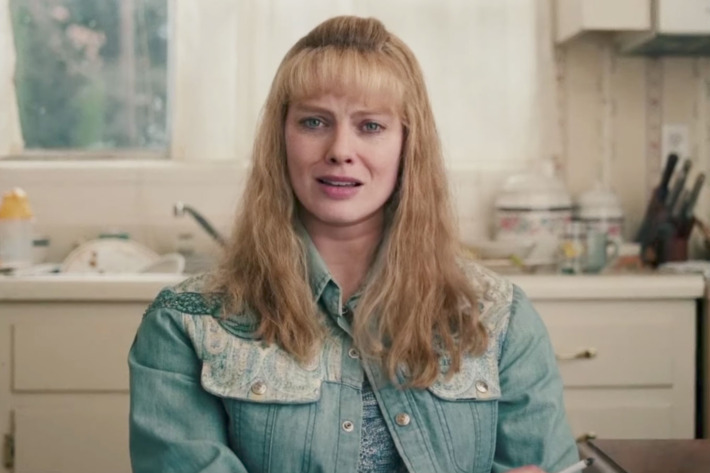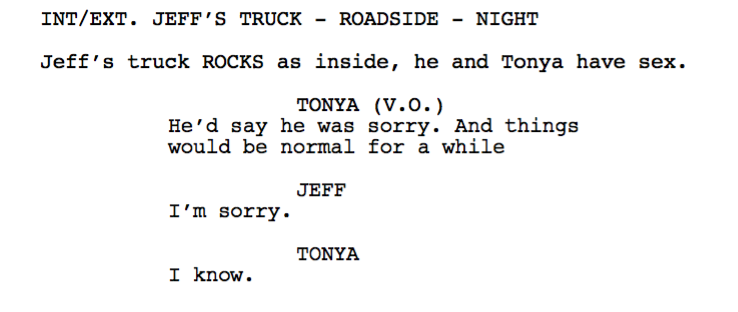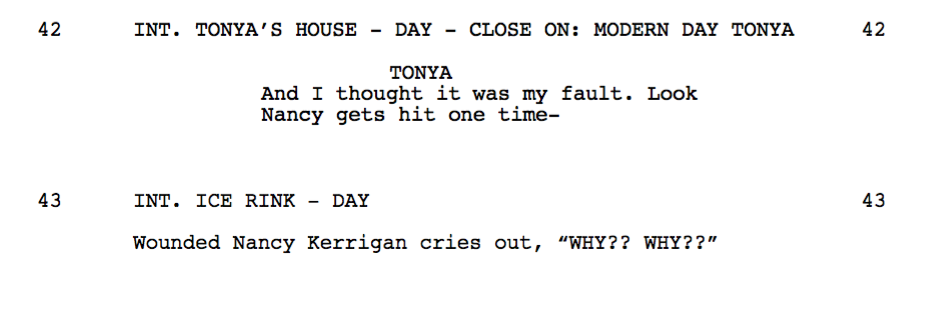Blueprints: "I, Tonya"
 Friday, February 23, 2018 at 9:10AM
Friday, February 23, 2018 at 9:10AM Jorge continuing to look at the screenplays of this year's Oscar crop...

All through this year’s awards campaign, the team behind I, Tonya has repeatedly stated that the movie came to be because of screenwriter Steven Roger’s interviews with Tonya Harding and Jeff Gillooly, in which he realized that they both had widely different recollections of their relationship.
The movie that came out of those interviews decided to play with perspective, memory, and point of view to give an unreliable retelling of this story, and playing with biopic tropes. Let’s take a look at how Rogers used various formal devices in the script to convey that we all remember things differently...
I, Tonya
Written by: Steven Rogers
[You can read the full script here. I will be talking about these pages.]
Less than being a story about a young figure skater fighting for her Olympic dreams, or the investigation surrounding the attack on Nancy Kerrigan, I, Tonya is about the cycle of abusive relationships in Tonya Harding’s life, and how each member involved in them (her mother Lavona, her husband Jeff, and herself) had different recollections of their motives and actions.
Because of the real-life interview available to Rogers, most of these accounts are Jeff and Tonya-based. As he learned from the footage, they each remembered the abuse in their relationship very differently: when it started, how it started, why it started, if it ever started. And Rogers uses three main devices throughout the film to depict this discrepancy in memory.
The first is Tonya's narration -- the movie is called I, Tonya after all. He uses her words to comment on the events that we see on screen, either to confirm or contradict them. She is the one guiding us through the story and telling us how to feel about it. She is trying to make us empathize with her side.

Second, since the script is based (as the title page indicates) on the “irony free, wildly contradictory, totally true interviews with Tonya Harding and Jeff Gillooly”, the film recreates some of the footage that Rogers shot. We have Tonya in her kitchen smoking a cigarette, and Jeff in a living room nonchalantly recounting how it was his life that was ruined.
This device is a constant reminder that what we are seeing is not purely factual, but two people retelling their story to a camera, decades after it happened. This is where the “wildly contradictory” aspect most comes into play, as there are several instances where Jeff and Tonya are telling completely opposite experiences.

***

Finally, the movie also engages the audience and our participation and judgment of the story by having the characters break the fourth wall and talk directly to us. It’s as if they know we are listening and watching them, and they are trying to make the case as to why their version is the true one.
In a scene depicting Tonya chasing after Jeff with a shotgun, she turns to us to clarify that she never did that. Later on, in what is perhaps the most incriminating scene of the movie and the one that makes its theme the loudest, she blames us (the collective “us”, the ever-present, judgmental “us”) for ruining her career.

I, Tonya is not the most faithful biopic of a brave and resilient heroine. This is not Darkest Hour or The Iron Lady. It is an experiment that uses an infamous story imprinted in the collective consciousness to comment on the way that we perceive, remember, and retell events.
The movie has won much deserved acclaim for its performances. But its script, if tonally uneven, has perhaps not been given enough credit for the level of difficulty in distilling a story we all thought we knew into the different points of view of the people that lived through it. Like landing a triple axel.
 Blueprints,
Blueprints,  I Tonya,
I Tonya,  Screenplays,
Screenplays,  biopics
biopics 


Reader Comments (3)
Agreed, thank you.
The movie is highly entertaining. Unlike Darkest Hour's boring shit.
Microsoft windows shortcut keys are the combination of keys. While we combined same selected keys together then this keys are performed as Microsoft windows shortcut keys.
http://shortkeys.top/